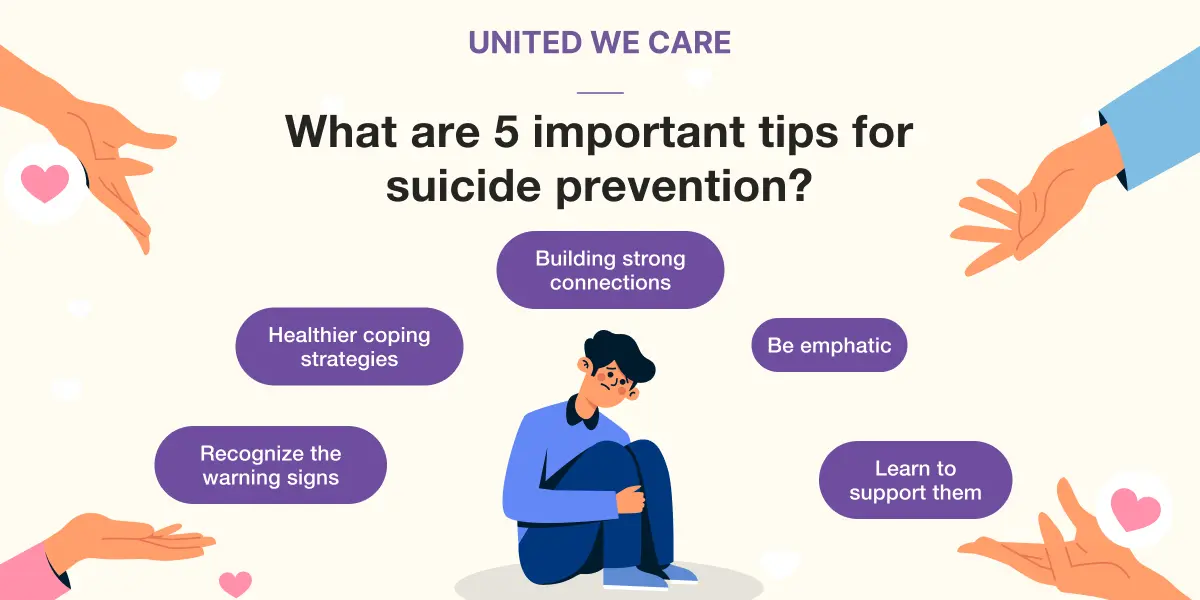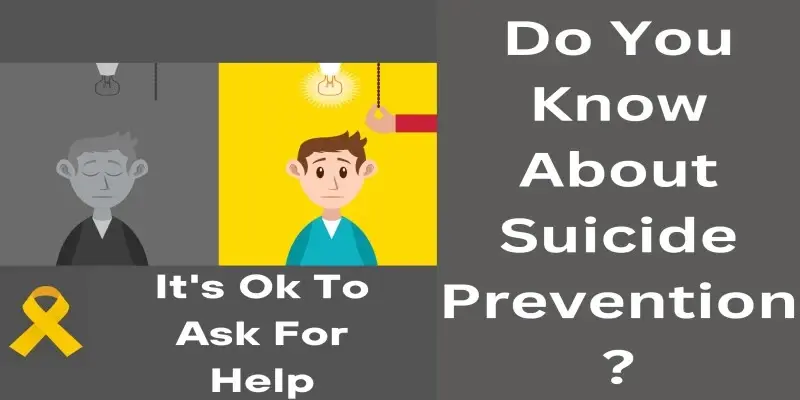Introduction
Suicide is a serious global public health issue. According to the World Health Organization (WHO), over 700,000 people die by suicide every year. [1] In this blog, we’ll discuss the emotional complexities of this issue, what current measures are being taken on a global level for suicide prevention, and what you can do at an individual level to create awareness and prevent suicide.
Suicide rates globally are at an all-time high, with a 7.1% increase in India alone between 2020 and 2021.[2] However, this act is preventable when individuals, communities, and governments collectively execute suicide prevention strategies.
The spectrum of suicidal behavior ranges from suicidal ideation to suicide attempts to death by suicide. Each and every life matters, so even though most cases of suicidal ideation do not progress into a suicide attempt, for every 25 persons who do attempt suicide, one person loses their life to it.[3]
Most cases of suicide are a result of feeling hopeless and helpless. Hence, mental health professionals, as well as community awareness and support, play a key role in addressing this issue.
What is suicide prevention?
Suicide prevention refers to the efforts we collectively put in to reduce the risk of and eventually eliminate suicide. Hence, these efforts are directed toward understanding the factors that lead to suicide so that strategies can be created and implemented in the right direction to save lives.
Why are these efforts necessary? Firstly, because every human life is valuable, and each of us deserves to lead a fulfilling life, and secondly, the emotional pain due to which a person decides to take their life does not end with this act; it merely passes on to their loved ones and their community. And most importantly, because suicide is not inevitable and can and must be intervened in time.
Suicide is a result of our deteriorating mental health, combined with factors such as social inequality, war and injustice, economic uncertainties, the pressure to conform to the unrealistic expectations of society, and the further distortion of reality by social media. Moreover, a deep-rooted cultural stigma around mental illness and seeking support causes suicidal ideation in close to 20% of cases.[4]
Who can make efforts towards suicide prevention, and how?
Various institutions and individuals collectively can strategize and take actions to prevent suicide, such as:
- The government: Suicide prevention through the funding and implementation of public health initiatives and programs such as the National Suicide Prevention Strategy (NSPS) launched in India on Nov. 21, 2022. [5] Designing social welfare programs that ensure everyone has access to food, housing, and healthcare and implementing unemployment policies can provide protection and improve the quality of mental well-being, thus reducing suicides. [6]
- Mental health professionals and organizations: They can bring in professional and credible perspectives on mental health, educate the masses and reduce the stigma, advocate for policy changes, and provide evidence-based treatment to those struggling with their mental health.
- Schools and universities: These institutions can shape the attitudes of the younger generations through awareness campaigns and support services such as the #SaySomething campaign by UC Santa Barbara.[7]
- Workplaces: Burnout is one of the major causes of our deteriorating mental health. Workplaces can support at-risk employees through initiatives such as assistance programs and mental health leaves. [8]
- Individuals and communities: By educating ourselves on mental health, learning to recognize the warning signs, and dedicating our time and resources to the cause, such as by volunteering at an NGO or advocating for better resources, we can help support those in need and prevent suicide.
What month is Suicide Prevention Month?
On September 10, 2003, the International Association for Suicide Prevention (IASP) launched this day as World Suicide Prevention Day in association with the WHO. This initiative marked an effort to focus attention on how suicide is a global problem and how it’s preventable.
September is Suicide Prevention Month, as recognized by the American Foundation for Suicide Prevention (AFSP), with the main aim of this observance being to raise awareness about suicide, shift how it is perceived, and spread hope and resources to at-risk individuals.
From 2021-2023, the theme for this initiative was “Creating Hope Through Action,” urging those experiencing suicidal thoughts that there is hope and also suggesting that every action has the potential to support someone in need.[9]
Five important tips for suicide prevention
It is possible to prevent suicide on an individual level by creating awareness and learning how to support someone in need immediately as well as long-term.

- Recognise the warning signs: A person may be at risk if they’re expressing hopelessness, helplessness, and thoughts about death or suicide, showing a sudden increased interest in topics related to death and dying, or making preparations such as a will and saying goodbyes to loved ones as if they won’t be seen again.
- Learn to support them: If someone is indicating ending their life, the first immediate step you can take is to create a safe environment for them, physically stay present with them, and encourage them to acknowledge their feelings. De-escalate the situation by practising deep breathing and grounding techniques with them. Once they’re out of the immediate threat, contact a mental health professional and encourage them to seek help.
- Be emphatic: Offer a safe space to them by encouraging them to express their feelings and listen without judgment.
- Healthier coping strategies: A balanced diet, exercise, and good sleep hygiene can go a long way in improving mental health, hence reducing the risk of suicide.
- Building strong connections: Bonding with friends, family, community, and society can provide significant support as well as protection against suicide. Peer support groups and community events can be safe spaces to connect.[10]
Therapy and suicide prevention
When the cause of suicidal ideation is an underlying mental health condition, cognitive behavioural therapy for suicide prevention (CBT-SP) has been proven effective. [11]
The method focuses on risk reduction and relapse prevention approaches. It is theoretically grounded in principles of cognitive-behavioural therapy, dialectical behavioural therapy, and targeted therapies for suicidal individuals with depression.
Conclusion
Suicide prevention is an umbrella term for efforts that government, healthcare professionals, educational institutions, workplaces, and communities can take to prevent individuals with suicidal behaviour from going through with the act. Individually, we can educate ourselves on this complex behaviour and provide empathy and a supportive environment for the ones who are suffering. Psychotherapy, such as cognitive behavioral therapy, is effective in dealing with the underlying mental health illness.
Check out United We Care’s self-paced wellness programs to learn important skills for improving mental health and preventing serious outcomes. If you or someone you know is exhibiting suicidal behaviour, book a session to seek immediate help from one of our mental health experts.
References:
[1] World Health Organization, “Suicide,” WHO. [Online]. Available: https://www.who.int/news-room/fact-sheets/detail/suicide. Accessed: Nov. 23, 2023.
[2] O. P. Singh, “Startling suicide statistics in India: Time for urgent action,” Indian Journal of Psychiatry, vol. 64, no. 5, pp. 431–432, 2022. [Online]. Available: https://doi.org/10.4103/indianjpsychiatry.indianjpsychiatry_665_22. Accessed: Nov. 23, 2023.
[3] SAVE, “2021 Data Page,” SAVE.org. [Online]. Available: https://save.org/wp-content/uploads/2023/01/2021datapgsv1.pdf. Accessed: Nov. 23, 2023.
[4] J.-I. Lee et al., “Prevalence of Suicidal Ideation and Associated Risk Factors in the General Population,” Journal of the Formosan Medical Association, vol. 109, no. 2, pp. 138-147, 2010. [Online]. Available: https://doi.org/10.1016/S0929-6646(10)60034-4. Accessed: Nov. 23, 2023.
[5] Ramdas Ransing, S M Yasir Arafat, Vikas Menon, Sujita Kumar Kar, “National Suicide Prevention Strategy of India: implementation challenges and the way forward,” The Lancet Psychiatry. [Online]. Available: https://www.thelancet.com/journals/lanpsy/article/PIIS2215-0366(23)00027-5/fulltext. Accessed: Nov. 23, 2023.
[6] Fiona Shand, Luke Duffy, and Michelle Torok, “Can Government Responses to Unemployment Reduce the Impact of Unemployment on Suicide?,” The Journal of Crisis Intervention and Suicide Prevention. [Online]. Available: https://econtent.hogrefe.com/doi/full/10.1027/0227-5910/a000750. Accessed: Nov. 23, 2023.
[7] University of California, Santa Barbara, “Say Something,” UCSB News. [Online]. Available: https://news.ucsb.edu/2013/013691/say-something. Accessed: Nov. 23, 2023.
[8] D. E. Boccio and A. M. Macari, “Workplace as Safe Haven: How Managers Can Mitigate Risk for Employee Suicide,” Journal of Workplace Behavioral Health, vol. 29, no. 1, pp. 32-54, 2014. [Online]. Available: https://doi.org/10.1080/15555240.2014.866472. Accessed: Nov. 23, 2023.
[9] World Health Organization, “World Suicide Prevention Day 2023,” WHO. [Online]. Available: https://www.who.int/campaigns/world-suicide-prevention-day/2023. Accessed: Nov. 23, 2023.
[10] American Psychiatric Association, “Suicide Prevention,” APA. [Online]. Available: https://www.psychiatry.org/patients-families/suicide-prevention. Accessed: Nov. 23, 2023.
[11] B. Stanley et al., “Cognitive-Behavioral Therapy for Suicide Prevention (CBT-SP): Treatment Model, Feasibility, and Acceptability,” Journal of the American Academy of Child & Adolescent Psychiatry, vol. 48, no. 10, pp. 1005-1013, 2009. [Online]. Available: https://doi.org/10.1097/CHI.0b013e3181b5dbfe. Accessed: Nov. 23, 2023.










